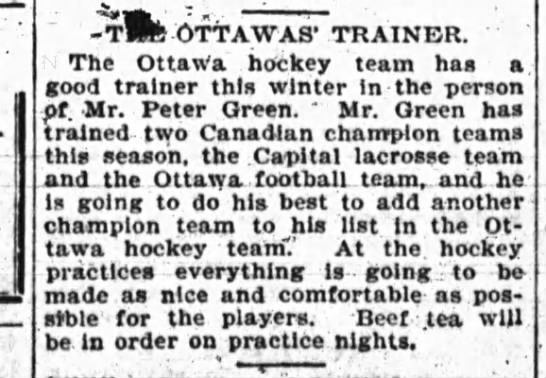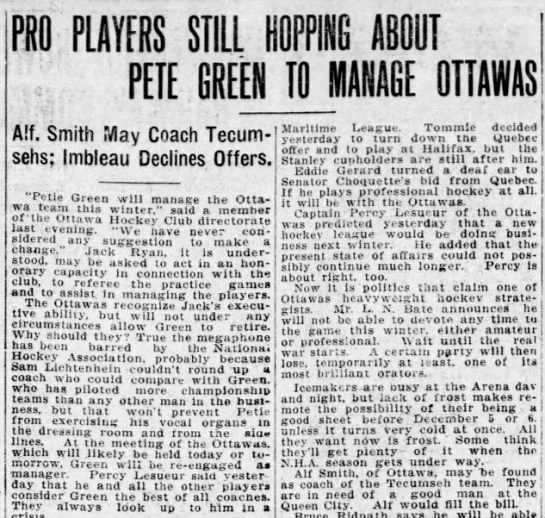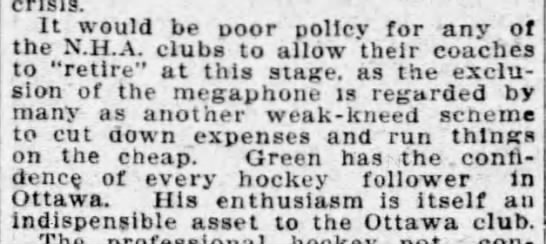The development from trainer to "coach" is nicely captured by those clippings.
1900: "a good trainer"; making everything nice and comfortable for the players at the trainings
1901: "trainer", "handler of the athletes"; putting players into splendid form and making winners out of them
1902: "trainer"
1903: had put players into splendid condition
1904: "trainer"
1908: "one of the best coaches", "manager of the team"
1910: "coach", "manager", deploying players at certain positions
1912: "manager", "coach"
1913: "manager", uses strategy and a defensive system
Do we know when the terms "coach" and "manager" first found their way onto the sports pages of those Canadian newspapers? Are there examples (slightly?) predating 1908 Pete Green?
This gets tricky and breaks down into sub-questions:
1) Were the words "coach" and "manager" in use on a given date?
2) Did those words imply the same meaning we now associate with them?
3) Did that role apply to hockey teams?
4) Did it apply at all levels of play?
I'm going to give my personal impressions based on general exposure and a little bit of directed research this morning. If someone is looking for a sports-history thesis topic, this would be a good one, because I don't think it has been deeply analyzed in regard to hockey specifically.
1) Etymological sources indicate that the word "coach" was first applied to athletics (as opposed to academics) in 1861. For point of reference, Pete Green was born in 1868, if that gives a sense of how fluid these concepts were during his actual playing/training career.
In my view, there are very few references to coaches or managers in Canadian papers prior to 1890. As mentioned above, this was the Athletic Club era when players were mostly self-trained in several sports simultaneously. Prior to that year, the mentions of coaching tend to be along the lines of teams
in other sports trying to elevate their level of play by hiring an expert to guide them. I would use 1890 as a general signpost for when coaching began to shift from something of an "outside consultant" role to a more regular feature of athletic teams.
2) This is very tricky because the language about these roles was very fluid prior to around 1920.
In my view (and I am not speaking definitively here, this is only an impression), on the odd occasion that the word "coach" appeared prior to around 1910, that word already implied a purely instructional role -- the exception being "player-coach", where there is some ambiguity as to whether the player was an instructor or merely a vocal leader.
The word "manager" is harder to pin down. It could mean a purely administrative role, as in the case of a rink manager who had responsibility for the business operations of a club. Or it could mean a purely logistical role, like a team manager carrying equipment. Or it could mean a director who scouted and signed players. Or it could mean someone that did all of those things and was undoubtedly also hanging around the rink instructing players. This word remained fluid clear into the 1930s, as the instructional role gradually became distinct from the managerial role.
"Trainer" almost always means an athletic trainer responsible for physical conditioning. Sometimes that's pretty clear-cut, but it also strays into a philosophical question -- when a trainer runs skating drills, is he now a coach? As early as the 1890s and certainly by the 1900s, we see cases of trainers
in other sports trying to direct players from the sidelines. It's unclear (and probably unanswerable) whether this was a significant factor for the players and how it would have related to instructions from a coach or playing-coach.
3) It seems hockey was late to get on board with the concept of coaches, which makes sense. Hockey was late to develop as an organized sport in general, and the format of the game prior to around 1910 didn't lend itself to in-game direction (there's a reason we saw coaches banned from using megaphones on the bench).
Whereas coaches were very common in baseball/cricket, football, soccer, and other sports, the absolute earliest references I see to clearly-defined hockey coaches are around the turn of the century and not really consistent until about 1905-10. I do think the case of Pete Green gradually taking over direction of the Ottawas from Alf Smith could be viewed as an allegory for what was happening broadly in the hockey world at that time.
4) This is another complicating factor when trying to pin down the role of a hockey coach in the early 1900s. In my view, it appears that the concept of a clearly-defined hockey coach first cropped up in the university ranks and youth leagues -- which, again, makes sense. Coaches prior to around 1910 were asked to share their playing wisdom and a sense of general strategy, but not much else. That seemed more suited for player development than for fine-tuning an Athletic Club team. The role of a non-playing coach for an elite adult player (other than keeping him in shape and in good standing) had not yet become apparent. It's not till the early 1910s, the generation of Lester Patrick and Art Ross, that we see an added emphasis on the role of a strategic director for top-level teams, and it seems relevant that by the 1920s the most prominent among these were men with an interest in the business management of profitable, professional teams. Even in the late 1910s, and even at the highest level of play, there was still seemingly a lot more demand for non-playing coaches at the university level than at the professional/elite level.
These are just my observations, but I hope this at least might help direct further investigation into the topic. The more I look at it, IMO Pete Green does indeed appear to be potentially a very significant figure in the development of the "coach" concept in hockey. I would suggest a deeper look into Green's proximity to Ross, the Patricks, Percy LeSueuer, and other early coaching figures during their time in the ECAHA. There's an argument to be made that their competitor's-eye view of the Silver Seven's bench dynamic may have had a significant influence on ECAHA alumni's concept of how to run a dominant hockey club.





